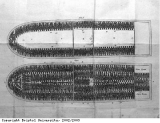Legislation in Parliament
There were many bills (propsed laws) introduced in Parliament to regulate or abolish the slave trade between 1788 and 1807. Some were lost by only a few votes. The Abolitionists, who were campaigning against the slave trade, must have been encouraged by the close outcome of these votes. It showed that many people were in support of ending the slave trade. The supporters of slavery would have been worried by how few votes were needed to lose their trade.
Popular opinion had an effect on the decision-makers in Parliament. Sometimes this popular support did not help the cause for which it was campaigning, as it could scare the government. There was a developing political movement amongst working people in the growing manufacturing towns, in response to their poor conditions of work and low pay. In 1793, the town of Sheffield, in the Midlands, sent a petition of 8,000 names to the Houses of Parliament in London, in support of the abolition of the slave trade. A petition to the government from the city of Manchester contained 10,639 signatures against the slave trade, which was over 1/5 of the population of the town. The working people of towns such as Sheffield and Manchester petitioned the Houses of Parliament to end the slave trade because they were becoming aware of other human struggles like their own.
The French Revolution, which overthrew the French monarchy, occurred in 1789. The rumour of revolution in France added fuel to the unrest amongst the slaves on the French-owned Caribbean island of Haiti. It resulted in a successful slave rebellion. Abolition became linked with anti-royal feeling, and the desire for political and social change. Such strong and potentially dangerous, or ‘radical’, feelings must have concerned those in power. Their association with the Abolition campaign may have actually damaged the campaigners efforts to end slavery. But the abolition of the slave trade had strong supporters in the Houses of Parliament, and it eventually succeeded through this support rather than through mass popular support.
In 1788, the Dolben Act was passed by Parliament. The act was introduced by William Dolben, abolitionist and M.P. for Oxford University. This act was intended to improve the slave trade, not end it altogether. It restricted the number of slaves that could be carried on a ship according to its weight in tons. This would mean generally that far fewer slaves were carried per ship than had been in the past, and in theory it would improve the conditions for the enslaved Africans. The nine slave ships owned by Bristol’s biggest slave trader, James Jones, would have to reduce their ‘cargoes’ of enslaved Africans by nearly one quarter to comply with this new act. This image of the plan of the Brookes slave ship is from a leaflet published by the Plymouth Committee of Abolitionists in 1788. The plan of the Brookes shows how the slaves were packed into the hold of the ship. Here the slaves are ‘stowed in the proportion of not quite One to a Ton’, which meant that legally the ship could carry 295 slaves. On a previous voyage, the Brookes had carried 609 enslaved Africans. In 1789, an Act was passed which made more small improvements in the conditions on board ship for the enslaved Africans and also for the crew.
A Bill (proposed law) for the Abolition of the Slave Trade was introduced into the House of Parliament in 1790 to be voted upon by Members of Parliament. Unfortunately, the proposed law was lost by 163 votes to 88. Those who were against the slave trade then proceeded more cautiously. In 1791 they introduced a bill, which would allow instead for the gradual abolition of the slave trade by 1796. This bill was agreed to and passed by the members of the House of Commons, but it was not passed in the House of Lords which meant that it could not be made law. The same bill was re-introduced by the Abolitionists in 1793 and this time was rejected by the House of Commons, without reaching the House of Lords.
In the same year, 1793, a bill that would abolish part of the slave trade, and stop British slave traders supplying foreign countries with slaves was defeated. The bill was lost by 31 votes to 29 in the House of Commons. The following year, 1794, this bill was reintroduced by the supporters of Abolition and passed by the House of Commons but lost in the House of Lords. Another bill for the Abolition of the trade by 1796 was introduced to Parliament in 1795 but was lost in the House of Commons by 78 votes to 57. A Bill introduced in 1796 for Abolition in 1797 was lost by 74 votes to 70.
Also in 1796, a motion (a proposed change in the law) was introduced to improve conditions for slaves in the Caribbean. This motion was lost, but the following year another similar motion was passed by 96 votes to 93.




